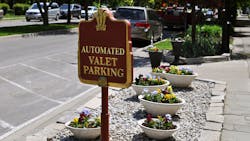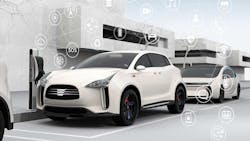Autonomous Valet Parking Solution Demo On Tap for IAA Mobility 2021
What you'll learn:
- The group involved in the AVP demo.
- What other automated services beyond AVP will be demo'd by the group at IAA?
- The components involved in the AVP solution.
The aim of an autonomous valet parking (AVP) solution is to create a technological basis on which vehicles from different manufacturers can communicate with different infrastructures. Thus, driverless vehicle movements can be carried out, optimizing the use of parking space.
Unikie, a Finnish software technology company, has developed an AVP solution as part of a joint venture between leading car manufacturers and technology developers, coordinated by the German Association of the Automotive Industry, VDA.
The car manufacturers—BMW, Ford, Jaguar-Land Rover, and Mercedes Benz—participated in developing automated parking, as did the automotive software subsidiary of the Volkswagen Group CARIAD. They’re joined by technology and infrastructure providers Bosch, Continental, Valeo, and the Leipzig startup Kopernikus Automotive
The automated parking solution utilizes data and machine learning to park the vehicle completely independently without any assistance from the driver. The system consists of a smart infrastructure created for the parking garage by Unikie, where sensors and cloud computing enable communication between the car and its surroundings.
The system works together with interfaces that car manufacturers have developed for their vehicles. Thanks to the infrastructure’s sensors, all of the solution needs from a vehicle are features such as parking assist and emergence brake assist. Besides the automotive industry, the solution has a wide range of application possibilities, such as for harbors. In other words, it can be applied to any industrial environment where tight, efficient parking of a transportation or industrial entity is a necessity.
The latest developments in autonomous parking will be showcased at the Internationale Automobil-Ausstellung (IAA) Mobility 2021 auto show in September. IAA, organized by the German Association of the Automotive Industry (VDA), is one the largest international mobility and automobile exhibitions. It has been held every other year in Frankfurt since 1991. This year, the exhibition will take place at a new venue, Munich, for the first time from September 7 to 12, 2021. The AVP demonstrations will occur several times a day in Munich’s “Messe West” car park.
The Demo
The public unveiling will showcase the technical interaction required between autonomous-driving systems of various automakers and the sensor technology in the parking garage, which takes over control of the vehicle to manage parking. Unikie will supply the smart infrastructure, where sensors and cloud computing enable communication between the car and its surroundings.
Aside from autonomous parking, the demonstration will showcase a variety of automated vehicle services such as washing and loading while the vehicle is in the parking garage, as well as the automated return of the vehicle to its driver.
Both technology and standardization have now matured sufficiently for automated valet parking to provide a reliable, automated parking and collection service. “Parking yourself could soon be a thing of the past in many places,” said Joachim Damasky, Managing Director of the VDA. “At the IAA, we are demonstrating that AVP for vehicles from several manufacturers and various infrastructures is a reality and will soon become part of everyday life. That is another milestone on the path to autonomous driving and the mobility of the future.”
With AVP, automotive manufacturers and car park operators can offer their customers new services, time savings, and new added value. The entire customer experience can be produced through a dashboard or mobile application.
Automating parking area or garage traffic reduces risks of accidents and offers possibilities for new automated services such as:
- Automated charging of EVs on demand (the charged vehicle can be moved from the charging bay to a new spot, freeing the bay for other vehicles)
- Automated car wash service
- Quick car drop-off and pick-up
- Fast online vehicle software updates
- Automated winter/summer tire changes
The key idea behind automated valet parking is to remotely plan and control the movement of multiple vehicles in real-time using a centralized and automated vehicle control platform (control hub). The platform defines and shares the mission route and specifications for specific vehicles.
How Does It Work?
In operation, smart parking garage infrastructure would detect the vehicle's position when in AVP mode and maneuver the vehicle through the garage without a driver, all while avoiding potential collisions. The AVP solution uses mapping and sensor fusion from multiple sources (LiDAR, cameras, radar, etc.) for accurate localization and positioning of a specific vehicle, and edge computing to relay the maneuvering commands to a vehicle through a secure network connection.
For effective interaction with the sensors in the infrastructure, the vehicles must have automatic transmission, electronic stability (ESP) to detect a loss of steering control, an electric parking brake, assisted steering, and a smart communication unit for AVP. More and more future models are expected to be suitably equipped, which will help accelerate universal introduction of driverless parking based on a smart infrastructure.
The AVP solution uses the car’s telematics, electric power steering, automatic gear box, and cruise control to remotely control its movement as if the car had full Level 4 autonomous capabilities. The control algorithms can plan maneuvers and guide cars more accurately than a human driver would, producing precise and repeatable results while simultaneously moving and parking a large number of vehicles safely.
The International Organization for Standardization (ISO) is preparing an international standard, ISO 23374, to define the standards for automated parking and the technological requirements for both automakers and equipment suppliers. It will ensure that the AVP function works properly between the necessary actors, i.e., the different vehicle OEMs and the providers of technological equipment and infrastructure.

